The Tempest
By
William Shakespeare
MR. WILLIAM
SHAKESPEARES
COMEDIES,
HISTORIES, &
TRAGEDIES.
Published according to the True Originall Copies.
London
Printed by Isaac Jaggard, and Ed. Blount.
1623.
The Scene, [A ship at sea and] an uninhabited IslandislandislandDuring the early modern period, knowledge of the world was expanding greatly. It is likely, given the plot of the tale, that the fictional Island Prospero is stranded on is somewhere in the Mediterranean sea. Throughout the play, you will note references to many places across the globe, including Tunisia, Algeria, the Island of Bermuda, and "Arabia." By 1611, when The Tempest was first performed, England had established colonies in the Americas; the Spanish and Portuguese were the most powerful imperial force in Western Europe, until the 1588 defeat of the Spanish Armada, which marked the rise of the early British Empire. The 16th and 17th centuries are often thought of as an age of exploration; explorers traveled the world, bringing back strange objects and stories to spur scientific discovery and commerce, including the traffic in human beings. People during Shakespeare’s time lived during an era that also saw the wide dissemination of maps helped by the invention of the printing press. Through cartography, people could visually comprehend the geographical layout of lands familiar and new. To learn more about exploration and map-making in the early modern period, see the Folger Shakespeare Library's exhibition site, "Mapping Early Modern Worlds. - [TH].
- Alonso, King of Naples
- Sebastian his brother
- Prospero, the right Duke of Milan
- Antonio, his brother the usurping Duke of Milan
- Ferdinand, son to the King of Naples
- Gonzalo, an honest old Counsellor
- Adrian and Francisco, Lords
- Caliban, a savage and deformed Slave
- Trinculo, a Jester
- Stephano, a drunken Butler
- Master of a Ship
- Boatswain
- Mariners
- Miranda, daughter to Prospero
- Ariel, an airy Spirit
- Iris, Ceres, Juno, Nymphs, Reapers, [presenting] Spirits
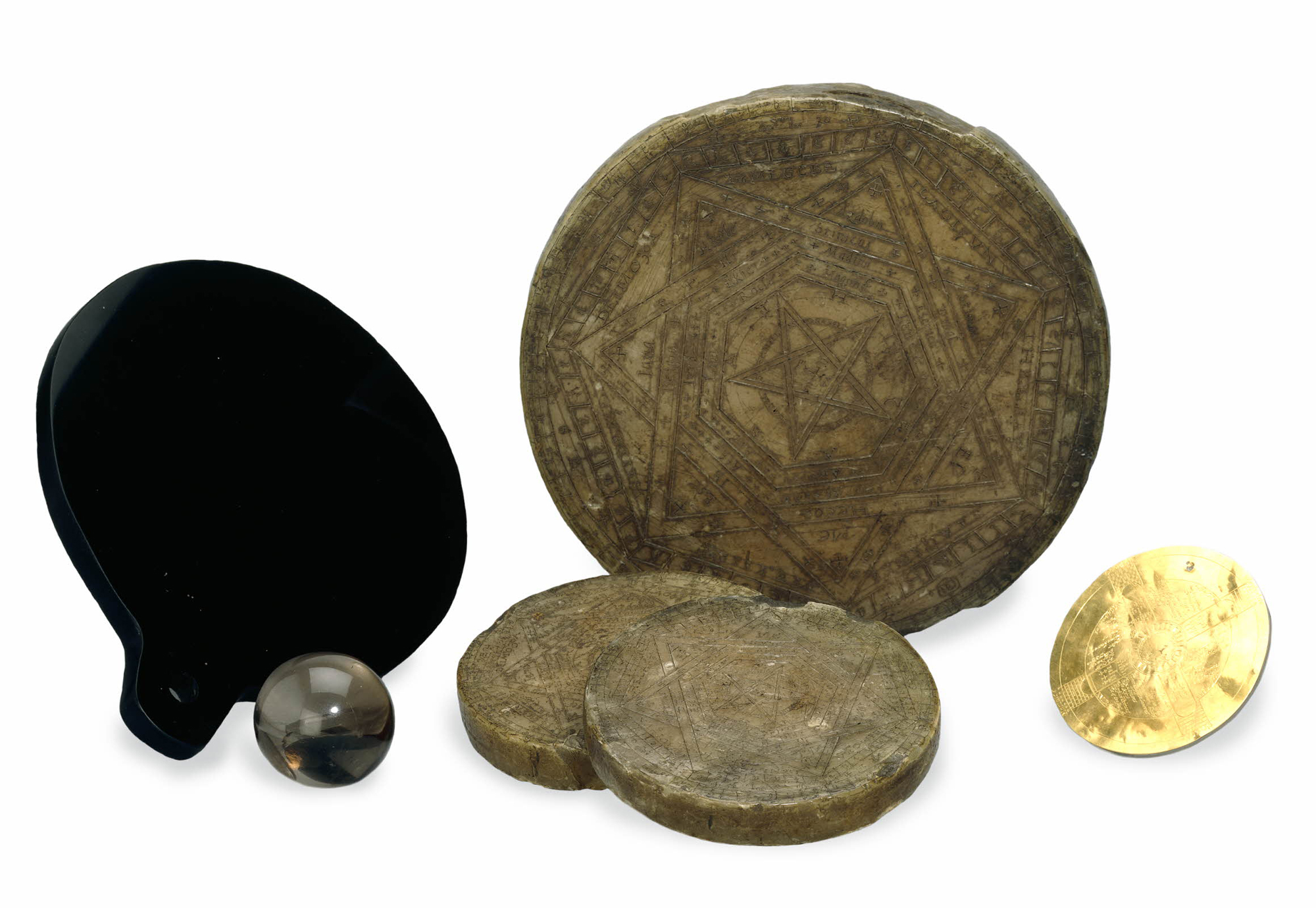 Source: Dee's spirit mirror and other alchemical objectsIt is often thought
that Prospero was modeled by Shakespeare on John Dee, a well-known polymath,
magus, and advisor to Queen Elizabeth I. According to the British Library, a magus someone who "understands the cosmos and
man's place in it [sic]" through knowledge and experimentation in fields
such as chemistry (then alchemy), mathematics, astrology, and hermetic
studies of religion and culture. A "controversial figure" and force of both
good and evil, the magus sought to attain ultimate wisdom about the working
of the universe. The image included here, from the
British Library, shows (right to left) Dee’s spirit mirror
showstone, a crystal ball, mystically engraved wax discs, a wooden case, and
an engraved gold disc illustrating a vision of Dee’s colleague, Edward
Kelley. Dee's "showstone' was a reflective piece of volcanic ash he would use to
conjure and converse with angels, recording his conversations into his
‘angelic diaries’. As an advisor to Queen Elizabeth I, Dee advocated for imperial
expansion into the New World. To learn more about Dee's advocacy of the
British Empire in the Atlantic, see Glyn Parry's scholarly article, "John Dee and the
Elizabethan British Empire in Its European Context." - [MUStudStaff], you
have2Put the wild waters in this roar, allay them.3The sky, it seems, would pour down stinking pitchstinkingstinkingMiranda here imagines
the stormy sky raining "stinking pitch" instead of water. Pitch is a resin
commonly used for waterproofing boats. - [LD],4But that the sea, mounting to the welkin's cheekwelkinwelkinThe welkin is a poetic and now archaic term referring
to the sky. Miranda uses figurative language to describe the the height of
the waves, which "[mount or rise] to the welkin's cheek." - [LD],5Dashes the firefirefireThe
lightening. - [LD] out. O, I have suffered6With those that I saw suffer: a brave vessel,7Who had, no doubt, some noble creature in her,8Dash'd all to pieces. O, the cry did knock9Against my very heart. Poor souls, they perish'd.10Had I been any god of power, I would11Have sunk the sea within the earth or ere12It should the good ship so have swallow'd and13The fraughting souls within her.
Source: Dee's spirit mirror and other alchemical objectsIt is often thought
that Prospero was modeled by Shakespeare on John Dee, a well-known polymath,
magus, and advisor to Queen Elizabeth I. According to the British Library, a magus someone who "understands the cosmos and
man's place in it [sic]" through knowledge and experimentation in fields
such as chemistry (then alchemy), mathematics, astrology, and hermetic
studies of religion and culture. A "controversial figure" and force of both
good and evil, the magus sought to attain ultimate wisdom about the working
of the universe. The image included here, from the
British Library, shows (right to left) Dee’s spirit mirror
showstone, a crystal ball, mystically engraved wax discs, a wooden case, and
an engraved gold disc illustrating a vision of Dee’s colleague, Edward
Kelley. Dee's "showstone' was a reflective piece of volcanic ash he would use to
conjure and converse with angels, recording his conversations into his
‘angelic diaries’. As an advisor to Queen Elizabeth I, Dee advocated for imperial
expansion into the New World. To learn more about Dee's advocacy of the
British Empire in the Atlantic, see Glyn Parry's scholarly article, "John Dee and the
Elizabethan British Empire in Its European Context." - [MUStudStaff], you
have2Put the wild waters in this roar, allay them.3The sky, it seems, would pour down stinking pitchstinkingstinkingMiranda here imagines
the stormy sky raining "stinking pitch" instead of water. Pitch is a resin
commonly used for waterproofing boats. - [LD],4But that the sea, mounting to the welkin's cheekwelkinwelkinThe welkin is a poetic and now archaic term referring
to the sky. Miranda uses figurative language to describe the the height of
the waves, which "[mount or rise] to the welkin's cheek." - [LD],5Dashes the firefirefireThe
lightening. - [LD] out. O, I have suffered6With those that I saw suffer: a brave vessel,7Who had, no doubt, some noble creature in her,8Dash'd all to pieces. O, the cry did knock9Against my very heart. Poor souls, they perish'd.10Had I been any god of power, I would11Have sunk the sea within the earth or ere12It should the good ship so have swallow'd and13The fraughting souls within her.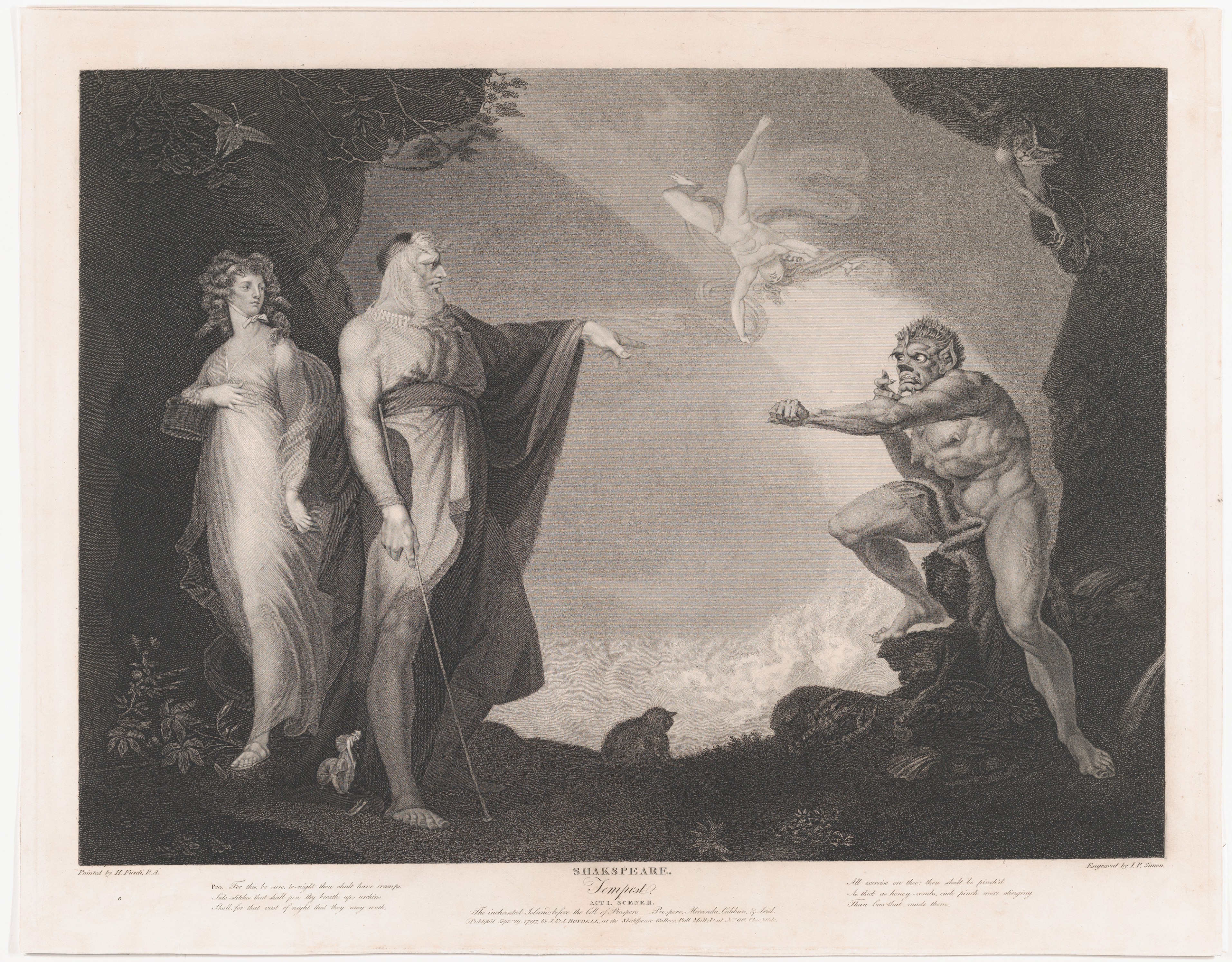 Source: Late 18th century engraving from the Metropolitan Museum of Art showing Miranda, Prospero, Caliban, and ArielAfter Miranda falls asleep, Prospero is
typically understood to put his magical robe back on as Ariel comes onto the
stage. The image here, an engraving after Henry Fusili, shows a late 18th
century rendition of Miranda, Prospero, Caliban, and the airy spirit Ariel
(Metropolitan Museum of Art). - [LD]
Source: Late 18th century engraving from the Metropolitan Museum of Art showing Miranda, Prospero, Caliban, and ArielAfter Miranda falls asleep, Prospero is
typically understood to put his magical robe back on as Ariel comes onto the
stage. The image here, an engraving after Henry Fusili, shows a late 18th
century rendition of Miranda, Prospero, Caliban, and the airy spirit Ariel
(Metropolitan Museum of Art). - [LD]
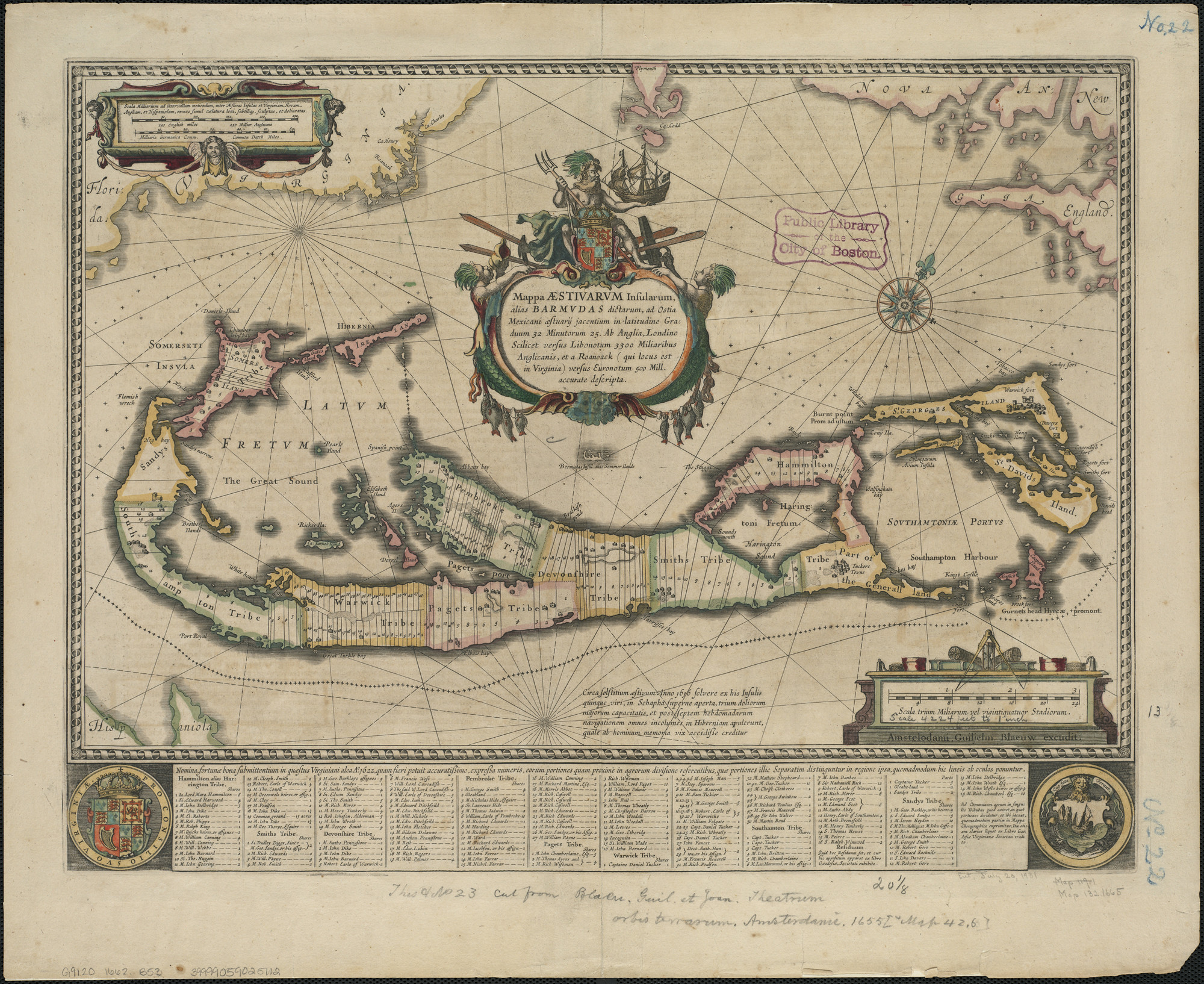 The Island of Bermuda was
devoid of any habitation by indigenous groups before it was discovered by
accident by the Spanish sailor Juan Bermúdez in 1503. A flotilla from
England, includng the Sea Venture, was shipwrecked here on their way to
restock the Jamestown Colony in Virginia (Virginia was named after Elizabeth
I, the "Virgin Queen," and Jamestown, after King James I). The wreck of the
Sea Venture in 1609, is thought to be a contemporary inspiration for The Tempest. After almost a year, the crew was largely
able to leave the Island with ships they built during that time. The Island
wasn’t colonized until the seventeenth century, after the crew of the Sea
Venture returned to England with their tale. Enslaved people were first
brought to the Island in 1617. The image included here shows a 17th century
map of the Island of Bermuda by Willem Janszoon Blaeu, from the Norman
B. Leventhal Map Center. Content of annotation sourced from Barry Lawrence Ruderman. - [MUStudStaff], there she's hid:228The mariners all under hatches stow'd;229Who, with a charm join'd to their suffer'd labour,230I have left asleep; and for the rest o' the fleet231Which I dispersed, they all have met again232And are upon the Mediterranean flote,234Supposing that they saw the king's ship wreck'd235And his great person perish.
The Island of Bermuda was
devoid of any habitation by indigenous groups before it was discovered by
accident by the Spanish sailor Juan Bermúdez in 1503. A flotilla from
England, includng the Sea Venture, was shipwrecked here on their way to
restock the Jamestown Colony in Virginia (Virginia was named after Elizabeth
I, the "Virgin Queen," and Jamestown, after King James I). The wreck of the
Sea Venture in 1609, is thought to be a contemporary inspiration for The Tempest. After almost a year, the crew was largely
able to leave the Island with ships they built during that time. The Island
wasn’t colonized until the seventeenth century, after the crew of the Sea
Venture returned to England with their tale. Enslaved people were first
brought to the Island in 1617. The image included here shows a 17th century
map of the Island of Bermuda by Willem Janszoon Blaeu, from the Norman
B. Leventhal Map Center. Content of annotation sourced from Barry Lawrence Ruderman. - [MUStudStaff], there she's hid:228The mariners all under hatches stow'd;229Who, with a charm join'd to their suffer'd labour,230I have left asleep; and for the rest o' the fleet231Which I dispersed, they all have met again232And are upon the Mediterranean flote,234Supposing that they saw the king's ship wreck'd235And his great person perish.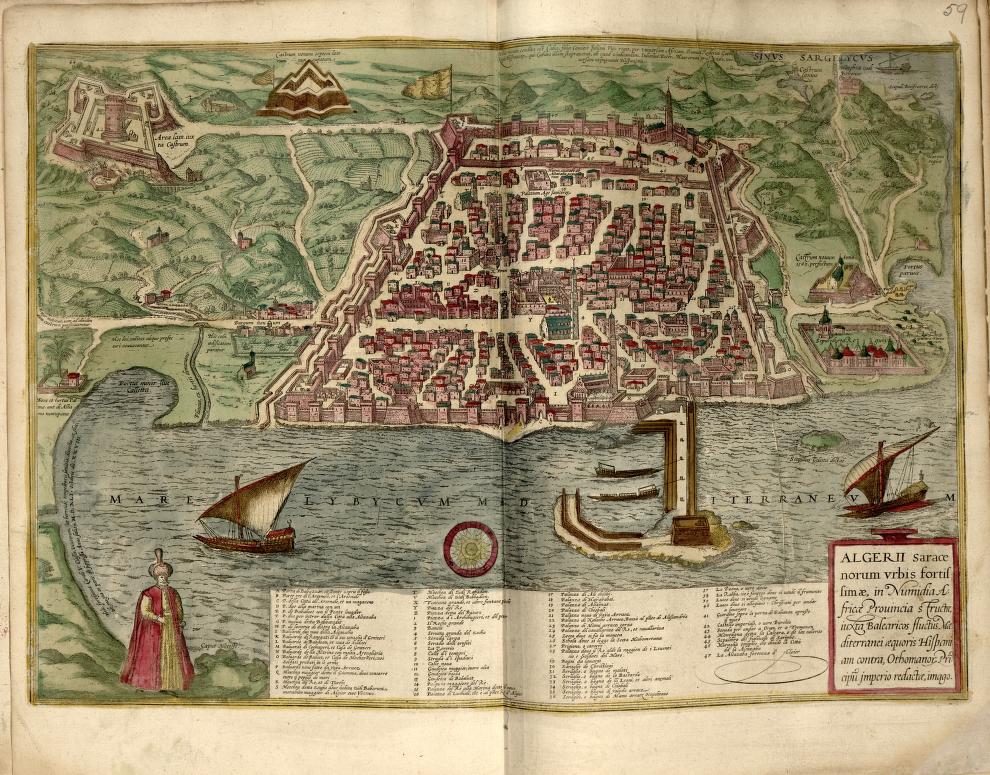 Sycorax seems to have been born in Argier or Algiers, the capital and
chief sea port of Algeria in North Africa, on the Mediterranean coast.
Invaded throughout its history, Algiers rose to prominence under the Berber
dynasties in the 10th century. Algiers became became home to many Muslim and
Jewish refugees escaping Spain in the begining of the 16th century. At the
time The Tempest was written, Algiers was under
Ottoman rule, and it became associated with piracy (Britannica).
The image included here, from the Library of
Congress’ first volume of Civitates Orbis Terrarum
(1588), shows the white buildings of the fort--and which gave it
its French name, “Alger la Blanche” (El-Bahdja in Arabic). - [LD].
Sycorax seems to have been born in Argier or Algiers, the capital and
chief sea port of Algeria in North Africa, on the Mediterranean coast.
Invaded throughout its history, Algiers rose to prominence under the Berber
dynasties in the 10th century. Algiers became became home to many Muslim and
Jewish refugees escaping Spain in the begining of the 16th century. At the
time The Tempest was written, Algiers was under
Ottoman rule, and it became associated with piracy (Britannica).
The image included here, from the Library of
Congress’ first volume of Civitates Orbis Terrarum
(1588), shows the white buildings of the fort--and which gave it
its French name, “Alger la Blanche” (El-Bahdja in Arabic). - [LD]._MET_DP828634.jpeg) Caliban is a complex character. He is described as a misshapen creature,
described as a "monster" "not honored with a human shape." He is treated as
an inferior by the humans in the play. The image here, sourced from Wikimedia Commons, is an 18th century etching of Caliban by John
Hamilton Mortimer (MET, 62.602.163). - [LD] my slave, who never307Yields us kind answer.
Caliban is a complex character. He is described as a misshapen creature,
described as a "monster" "not honored with a human shape." He is treated as
an inferior by the humans in the play. The image here, sourced from Wikimedia Commons, is an 18th century etching of Caliban by John
Hamilton Mortimer (MET, 62.602.163). - [LD] my slave, who never307Yields us kind answer.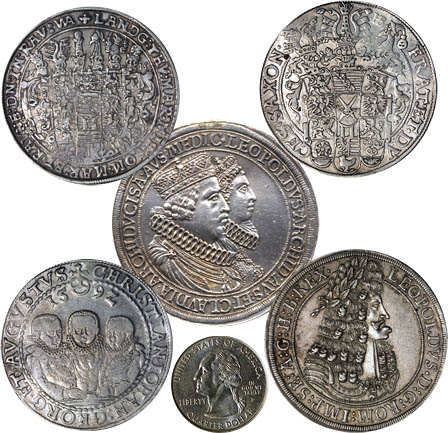 Source: A photographic representation of thalers from Wikimedia CommonsAccording to the OED, a dollar is the
English word for the thaler, a German coin of varying value used from the
16th century. The image here, sourced from Wikimedia
Commons, shows several thalers. - [LD].
Source: A photographic representation of thalers from Wikimedia CommonsAccording to the OED, a dollar is the
English word for the thaler, a German coin of varying value used from the
16th century. The image here, sourced from Wikimedia
Commons, shows several thalers. - [LD]. Source: Illustration of a harpy from Monstrorum Historia (1642)Ariel appears in the form of a harpy, a
greedy and fearsome mythological creature that metes out divine justice and
vengeance. Harpies have the head and body of a woman and the wings and claws of
a bird. Ariel is imagined as wreaking the 'divine' vengeance of Prospero. This
annotation and image are sourced from World History
Encyclopedia. The image here, also from the World History
Encyclopedia, is an illustration of the harpy from Ulisse Aldrovandi's Monstrorum Historia, Bologna, 1642. - [LD]; claps his
wings upon the table; and, with a quaint device, the banquet vanishes
Source: Illustration of a harpy from Monstrorum Historia (1642)Ariel appears in the form of a harpy, a
greedy and fearsome mythological creature that metes out divine justice and
vengeance. Harpies have the head and body of a woman and the wings and claws of
a bird. Ariel is imagined as wreaking the 'divine' vengeance of Prospero. This
annotation and image are sourced from World History
Encyclopedia. The image here, also from the World History
Encyclopedia, is an illustration of the harpy from Ulisse Aldrovandi's Monstrorum Historia, Bologna, 1642. - [LD]; claps his
wings upon the table; and, with a quaint device, the banquet vanishes
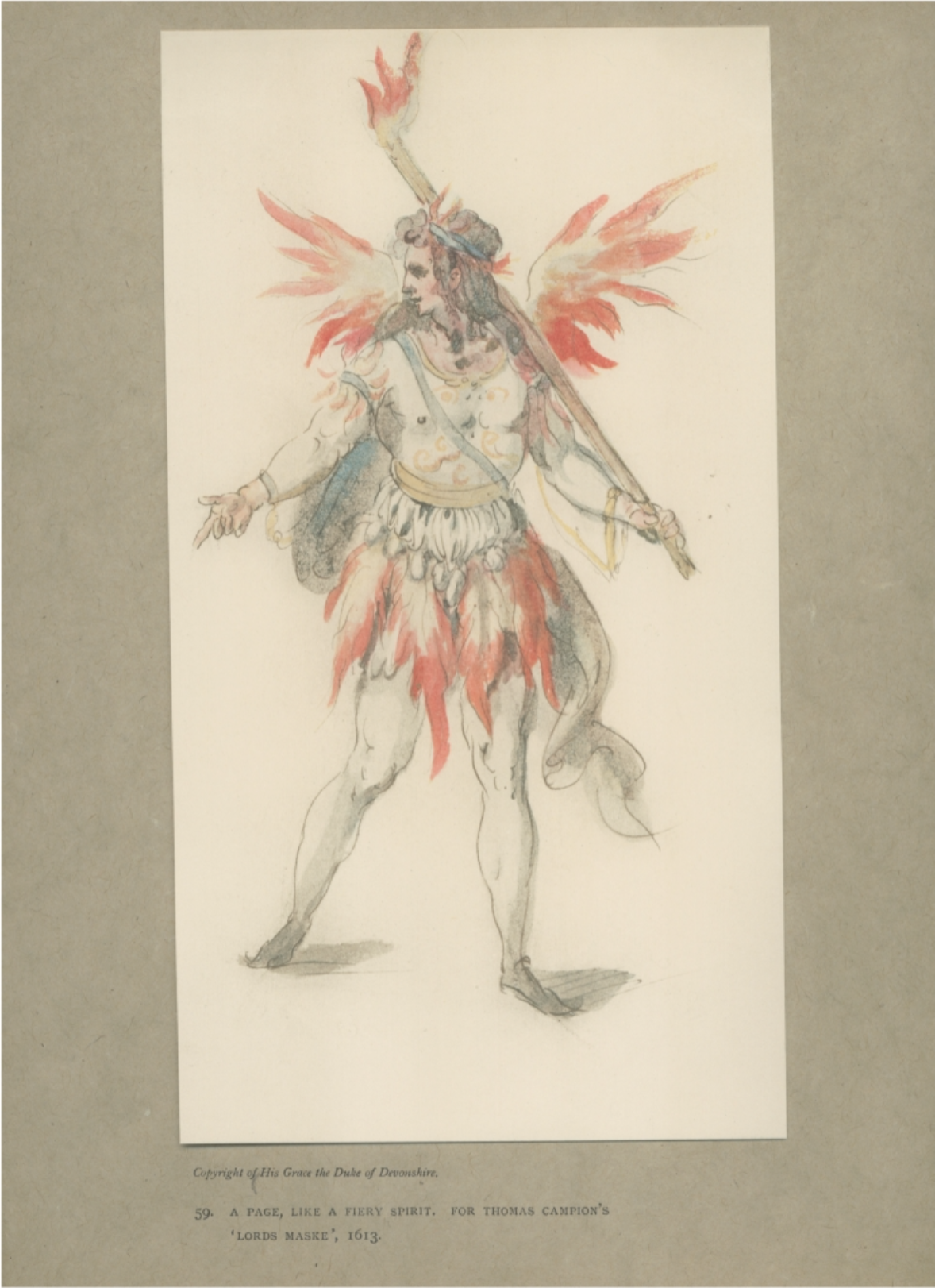 Source: https://www.jstor.org/stable/41830403Prospero
plans to use his magic to create the fantastic entertainment of a masque
for the young couple. According to material hosted by the Royal Historic Palaces, masques were
elaborate court entertainments staged for and often by nobility. They
involved a variety of performance types--ballet, opera, music, and
theater--combined in a highly visual and stylized manner. By the early
17th century, when Shakespeare wrote and performed The Tempest, they had
become highly elaborate. The Royal Banqueting House, designed by Inigo
Jones and completed in 1622, was purpose-built for the staging of
masques. The most popular early court masques were developed by Jones in
partnership with Ben Jonson.
Thematically, masques represented and reinforced the divinity of the
monarchy and symbolized a world of order in opposition to the baseness
and disorder that reigned before the emergence of the Stuart Court. In
The Tempest, Prospero conjures the masque as a gift for the young couple,
Miranda and Ferdinand, who will marry upon their return to Naples and
return order to the throne. This masque, like all masques, then, is a
statement of political power.
The image included here, from the illustrated catalog of masque designs
owned by the Duke and Duchess of Devonshire, shows a page dressed as a
fiery spirit--this character, like the nymphs and reapers in Prospero’s
masque, would likely have been a dancing role rather than a more
important speaking role.
An exceptional illustrated source is “Designs by Inigo Jones
for Masques & Plays at Court,” a descriptive catalog of a
key collection of masque designs, now hosted in JSTOR. The image included
here, from that illustrated catalog of masque designs, shows a page
dressed as a fiery spirit.
Brunel University London has produced a 360° video of a
modern version of a 17th century court masque, performed in the
Royal Banqueting House; the video is accessible via YouTube.
- [LD]:
it is my promise,44And they expect it from me.
Source: https://www.jstor.org/stable/41830403Prospero
plans to use his magic to create the fantastic entertainment of a masque
for the young couple. According to material hosted by the Royal Historic Palaces, masques were
elaborate court entertainments staged for and often by nobility. They
involved a variety of performance types--ballet, opera, music, and
theater--combined in a highly visual and stylized manner. By the early
17th century, when Shakespeare wrote and performed The Tempest, they had
become highly elaborate. The Royal Banqueting House, designed by Inigo
Jones and completed in 1622, was purpose-built for the staging of
masques. The most popular early court masques were developed by Jones in
partnership with Ben Jonson.
Thematically, masques represented and reinforced the divinity of the
monarchy and symbolized a world of order in opposition to the baseness
and disorder that reigned before the emergence of the Stuart Court. In
The Tempest, Prospero conjures the masque as a gift for the young couple,
Miranda and Ferdinand, who will marry upon their return to Naples and
return order to the throne. This masque, like all masques, then, is a
statement of political power.
The image included here, from the illustrated catalog of masque designs
owned by the Duke and Duchess of Devonshire, shows a page dressed as a
fiery spirit--this character, like the nymphs and reapers in Prospero’s
masque, would likely have been a dancing role rather than a more
important speaking role.
An exceptional illustrated source is “Designs by Inigo Jones
for Masques & Plays at Court,” a descriptive catalog of a
key collection of masque designs, now hosted in JSTOR. The image included
here, from that illustrated catalog of masque designs, shows a page
dressed as a fiery spirit.
Brunel University London has produced a 360° video of a
modern version of a 17th century court masque, performed in the
Royal Banqueting House; the video is accessible via YouTube.
- [LD]:
it is my promise,44And they expect it from me.Footnotes
 Source: Dee's spirit mirror and other alchemical objectsIt is often thought
that Prospero was modeled by Shakespeare on John Dee, a well-known polymath,
magus, and advisor to Queen Elizabeth I. According to the British Library, a magus someone who "understands the cosmos and
man's place in it [sic]" through knowledge and experimentation in fields
such as chemistry (then alchemy), mathematics, astrology, and hermetic
studies of religion and culture. A "controversial figure" and force of both
good and evil, the magus sought to attain ultimate wisdom about the working
of the universe. The image included here, from the
British Library, shows (right to left) Dee’s spirit mirror
showstone, a crystal ball, mystically engraved wax discs, a wooden case, and
an engraved gold disc illustrating a vision of Dee’s colleague, Edward
Kelley. Dee's "showstone' was a reflective piece of volcanic ash he would use to
conjure and converse with angels, recording his conversations into his
‘angelic diaries’. As an advisor to Queen Elizabeth I, Dee advocated for imperial
expansion into the New World. To learn more about Dee's advocacy of the
British Empire in the Atlantic, see Glyn Parry's scholarly article, "John Dee and the
Elizabethan British Empire in Its European Context."
Source: Dee's spirit mirror and other alchemical objectsIt is often thought
that Prospero was modeled by Shakespeare on John Dee, a well-known polymath,
magus, and advisor to Queen Elizabeth I. According to the British Library, a magus someone who "understands the cosmos and
man's place in it [sic]" through knowledge and experimentation in fields
such as chemistry (then alchemy), mathematics, astrology, and hermetic
studies of religion and culture. A "controversial figure" and force of both
good and evil, the magus sought to attain ultimate wisdom about the working
of the universe. The image included here, from the
British Library, shows (right to left) Dee’s spirit mirror
showstone, a crystal ball, mystically engraved wax discs, a wooden case, and
an engraved gold disc illustrating a vision of Dee’s colleague, Edward
Kelley. Dee's "showstone' was a reflective piece of volcanic ash he would use to
conjure and converse with angels, recording his conversations into his
‘angelic diaries’. As an advisor to Queen Elizabeth I, Dee advocated for imperial
expansion into the New World. To learn more about Dee's advocacy of the
British Empire in the Atlantic, see Glyn Parry's scholarly article, "John Dee and the
Elizabethan British Empire in Its European Context." Source: Late 18th century engraving from the Metropolitan Museum of Art showing Miranda, Prospero, Caliban, and ArielAfter Miranda falls asleep, Prospero is
typically understood to put his magical robe back on as Ariel comes onto the
stage. The image here, an engraving after Henry Fusili, shows a late 18th
century rendition of Miranda, Prospero, Caliban, and the airy spirit Ariel
(Metropolitan Museum of Art).
Source: Late 18th century engraving from the Metropolitan Museum of Art showing Miranda, Prospero, Caliban, and ArielAfter Miranda falls asleep, Prospero is
typically understood to put his magical robe back on as Ariel comes onto the
stage. The image here, an engraving after Henry Fusili, shows a late 18th
century rendition of Miranda, Prospero, Caliban, and the airy spirit Ariel
(Metropolitan Museum of Art). The Island of Bermuda was
devoid of any habitation by indigenous groups before it was discovered by
accident by the Spanish sailor Juan Bermúdez in 1503. A flotilla from
England, includng the Sea Venture, was shipwrecked here on their way to
restock the Jamestown Colony in Virginia (Virginia was named after Elizabeth
I, the "Virgin Queen," and Jamestown, after King James I). The wreck of the
Sea Venture in 1609, is thought to be a contemporary inspiration for The Tempest. After almost a year, the crew was largely
able to leave the Island with ships they built during that time. The Island
wasn’t colonized until the seventeenth century, after the crew of the Sea
Venture returned to England with their tale. Enslaved people were first
brought to the Island in 1617. The image included here shows a 17th century
map of the Island of Bermuda by Willem Janszoon Blaeu, from the Norman
B. Leventhal Map Center. Content of annotation sourced from Barry Lawrence Ruderman.
The Island of Bermuda was
devoid of any habitation by indigenous groups before it was discovered by
accident by the Spanish sailor Juan Bermúdez in 1503. A flotilla from
England, includng the Sea Venture, was shipwrecked here on their way to
restock the Jamestown Colony in Virginia (Virginia was named after Elizabeth
I, the "Virgin Queen," and Jamestown, after King James I). The wreck of the
Sea Venture in 1609, is thought to be a contemporary inspiration for The Tempest. After almost a year, the crew was largely
able to leave the Island with ships they built during that time. The Island
wasn’t colonized until the seventeenth century, after the crew of the Sea
Venture returned to England with their tale. Enslaved people were first
brought to the Island in 1617. The image included here shows a 17th century
map of the Island of Bermuda by Willem Janszoon Blaeu, from the Norman
B. Leventhal Map Center. Content of annotation sourced from Barry Lawrence Ruderman. Sycorax seems to have been born in Argier or Algiers, the capital and
chief sea port of Algeria in North Africa, on the Mediterranean coast.
Invaded throughout its history, Algiers rose to prominence under the Berber
dynasties in the 10th century. Algiers became became home to many Muslim and
Jewish refugees escaping Spain in the begining of the 16th century. At the
time The Tempest was written, Algiers was under
Ottoman rule, and it became associated with piracy (Britannica).
The image included here, from the Library of
Congress’ first volume of Civitates Orbis Terrarum
(1588), shows the white buildings of the fort--and which gave it
its French name, “Alger la Blanche” (El-Bahdja in Arabic).
Sycorax seems to have been born in Argier or Algiers, the capital and
chief sea port of Algeria in North Africa, on the Mediterranean coast.
Invaded throughout its history, Algiers rose to prominence under the Berber
dynasties in the 10th century. Algiers became became home to many Muslim and
Jewish refugees escaping Spain in the begining of the 16th century. At the
time The Tempest was written, Algiers was under
Ottoman rule, and it became associated with piracy (Britannica).
The image included here, from the Library of
Congress’ first volume of Civitates Orbis Terrarum
(1588), shows the white buildings of the fort--and which gave it
its French name, “Alger la Blanche” (El-Bahdja in Arabic)._MET_DP828634.jpeg) Caliban is a complex character. He is described as a misshapen creature,
described as a "monster" "not honored with a human shape." He is treated as
an inferior by the humans in the play. The image here, sourced from Wikimedia Commons, is an 18th century etching of Caliban by John
Hamilton Mortimer (MET, 62.602.163).
Caliban is a complex character. He is described as a misshapen creature,
described as a "monster" "not honored with a human shape." He is treated as
an inferior by the humans in the play. The image here, sourced from Wikimedia Commons, is an 18th century etching of Caliban by John
Hamilton Mortimer (MET, 62.602.163). Source: A photographic representation of thalers from Wikimedia CommonsAccording to the OED, a dollar is the
English word for the thaler, a German coin of varying value used from the
16th century. The image here, sourced from Wikimedia
Commons, shows several thalers.
Source: A photographic representation of thalers from Wikimedia CommonsAccording to the OED, a dollar is the
English word for the thaler, a German coin of varying value used from the
16th century. The image here, sourced from Wikimedia
Commons, shows several thalers. Source: Illustration of a harpy from Monstrorum Historia (1642)Ariel appears in the form of a harpy, a
greedy and fearsome mythological creature that metes out divine justice and
vengeance. Harpies have the head and body of a woman and the wings and claws of
a bird. Ariel is imagined as wreaking the 'divine' vengeance of Prospero. This
annotation and image are sourced from World History
Encyclopedia. The image here, also from the World History
Encyclopedia, is an illustration of the harpy from Ulisse Aldrovandi's Monstrorum Historia, Bologna, 1642.
Source: Illustration of a harpy from Monstrorum Historia (1642)Ariel appears in the form of a harpy, a
greedy and fearsome mythological creature that metes out divine justice and
vengeance. Harpies have the head and body of a woman and the wings and claws of
a bird. Ariel is imagined as wreaking the 'divine' vengeance of Prospero. This
annotation and image are sourced from World History
Encyclopedia. The image here, also from the World History
Encyclopedia, is an illustration of the harpy from Ulisse Aldrovandi's Monstrorum Historia, Bologna, 1642. Source: https://www.jstor.org/stable/41830403Prospero
plans to use his magic to create the fantastic entertainment of a masque
for the young couple. According to material hosted by the Royal Historic Palaces, masques were
elaborate court entertainments staged for and often by nobility. They
involved a variety of performance types--ballet, opera, music, and
theater--combined in a highly visual and stylized manner. By the early
17th century, when Shakespeare wrote and performed The Tempest, they had
become highly elaborate. The Royal Banqueting House, designed by Inigo
Jones and completed in 1622, was purpose-built for the staging of
masques. The most popular early court masques were developed by Jones in
partnership with Ben Jonson.
Thematically, masques represented and reinforced the divinity of the
monarchy and symbolized a world of order in opposition to the baseness
and disorder that reigned before the emergence of the Stuart Court. In
The Tempest, Prospero conjures the masque as a gift for the young couple,
Miranda and Ferdinand, who will marry upon their return to Naples and
return order to the throne. This masque, like all masques, then, is a
statement of political power.
The image included here, from the illustrated catalog of masque designs
owned by the Duke and Duchess of Devonshire, shows a page dressed as a
fiery spirit--this character, like the nymphs and reapers in Prospero’s
masque, would likely have been a dancing role rather than a more
important speaking role.
An exceptional illustrated source is “Designs by Inigo Jones
for Masques & Plays at Court,” a descriptive catalog of a
key collection of masque designs, now hosted in JSTOR. The image included
here, from that illustrated catalog of masque designs, shows a page
dressed as a fiery spirit.
Brunel University London has produced a 360° video of a
modern version of a 17th century court masque, performed in the
Royal Banqueting House; the video is accessible via YouTube.
Source: https://www.jstor.org/stable/41830403Prospero
plans to use his magic to create the fantastic entertainment of a masque
for the young couple. According to material hosted by the Royal Historic Palaces, masques were
elaborate court entertainments staged for and often by nobility. They
involved a variety of performance types--ballet, opera, music, and
theater--combined in a highly visual and stylized manner. By the early
17th century, when Shakespeare wrote and performed The Tempest, they had
become highly elaborate. The Royal Banqueting House, designed by Inigo
Jones and completed in 1622, was purpose-built for the staging of
masques. The most popular early court masques were developed by Jones in
partnership with Ben Jonson.
Thematically, masques represented and reinforced the divinity of the
monarchy and symbolized a world of order in opposition to the baseness
and disorder that reigned before the emergence of the Stuart Court. In
The Tempest, Prospero conjures the masque as a gift for the young couple,
Miranda and Ferdinand, who will marry upon their return to Naples and
return order to the throne. This masque, like all masques, then, is a
statement of political power.
The image included here, from the illustrated catalog of masque designs
owned by the Duke and Duchess of Devonshire, shows a page dressed as a
fiery spirit--this character, like the nymphs and reapers in Prospero’s
masque, would likely have been a dancing role rather than a more
important speaking role.
An exceptional illustrated source is “Designs by Inigo Jones
for Masques & Plays at Court,” a descriptive catalog of a
key collection of masque designs, now hosted in JSTOR. The image included
here, from that illustrated catalog of masque designs, shows a page
dressed as a fiery spirit.
Brunel University London has produced a 360° video of a
modern version of a 17th century court masque, performed in the
Royal Banqueting House; the video is accessible via YouTube.
![Page [TP]](https://anthologyassetsdev.lib.virginia.edu/shakespeare-tempest/pageImages/TP.png)


















